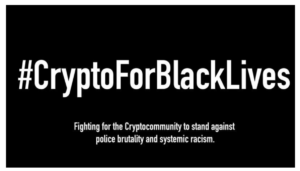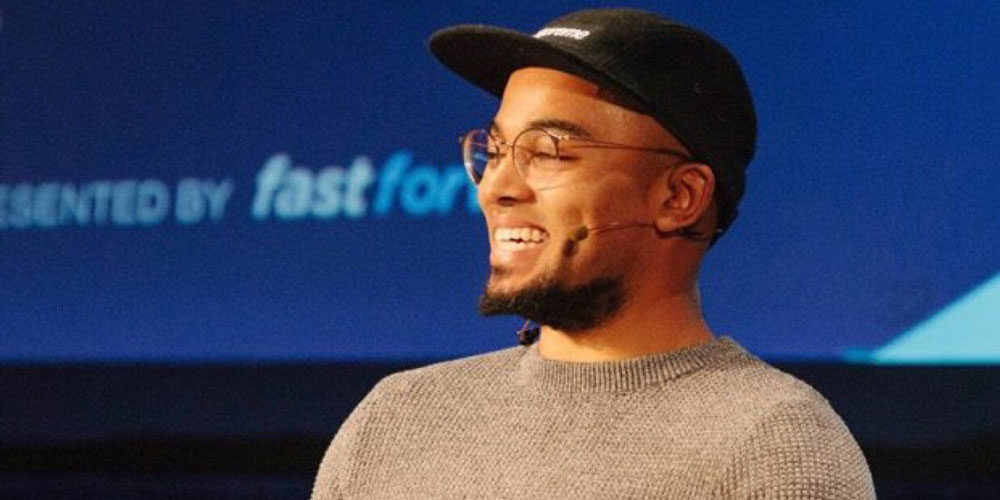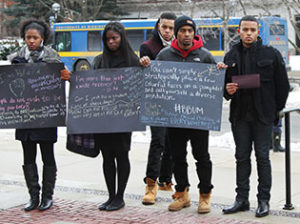Tell me what you see
Optics transcend words when communicating the urgency of a movement like Black Lives Matter (BLM). To say police killed George Floyd in Minneapolis is one thing. To watch his murder play out in real time, for nearly nine minutes, is quite another.
As a student activist at U-M, tech entrepreneur Robert Greenfield IV, BS ’15, recognized the power of optics early on. He was treasurer in the Black Student Union (BSU) and a leader of 2013’s campus-wide Twitter campaign Being Black at Michigan (#BBUM). The group staged its first event on MLK Day 2014.
In a classic example of organizing for strategic impact, the students generated national media coverage by making seven dramatic demands of the administration. Activists replicated the campaign at other universities and sparked a national dialogue about diversity on college campuses.
Fast forward to early June 2020. COVID-19 has virtually locked down the nation. BLM activists have taken to the streets to protest police brutality where they are met with more police brutality. Outbursts of fringe violence spark looting amid mostly nonviolent marches. The police respond with tear gas and rubber bullets. Chaos is the order of the day. And Greenfield, now based in Oakland, Calif., is still in the action and still thinking strategically.
Taking it to the streets
Today he is co-founder and CEO of the public benefit corporation Emerging Impact. Still an activist, Greenfield leverages emerging technology to lead social impact pilots with major NGOs and international aid organizations. Most recently, he has been helping coordinate BLM marches in his current home city.
“What are the protest routes, the protest schedules that will 1) get our point across, and 2) create the kind of imagery for people outside the state and the country to see this and say, ‘OK, this is really bad,’” he says.An image of nonviolent citizens kneeling in front of police headquarters would make a profound, multilayered point, he thinks. It might pull the country’s attention back to the core movement and away from the rioting.
It would be a more dramatic move than anything he’d done with #BBUM. Marching alongside 15,000 activists who outnumber police in a major American city stands in sharp contrast to protesting on the Diag, he says.
“Kneeling in front of the Oakland PD is really powerful but it’s also scary as hell,” Greenfield says. He couldn’t help but wonder: “If we do this, will they shoot us?”
Worse than it looks
After graduating from U-M with a degree in industrial engineering, Greenfield earned his MBA from Goizueta Business School at Emory University. He took the combined skill set to the social impact space and has since traveled to New York, Atlanta, the Philippines, Hong Kong, and more.
His idealism has taken a few hits since 2014, though. He and his fellow student protesters had demanded the U-M administration work to increase black enrollment to at least 10 percent. Still, just 4 percent of domestic undergraduates are black today.“Being on the post-graduate side,” Greenfield says, “you start to realize a lot of the things you saw as injustices when you were a student are actually worse when you start working.”
Diverse executive teams and employee resource groups may be well-intentioned, “but that doesn’t substitute for a company actually caring, or a team being culturally competent,” he says.
Experiencing deeply rooted, intergenerational biases in the workforce has hardened him.
“Unfortunately, you get to a point where you just don’t feel anything: You’re numb. And then the other part becomes kind of strategic, like ‘OK, what dosage of racism am I going to accept within my life and how am I going to traverse that?’”
Racism goes far beyond hearing the N-word, says Greenfield. He is talking about events that can “completely transform people’s life trajectories to the point they don’t realize their full selves.”
Do it yourself
The patience required to experience fundamental change in corporate America is in short supply for young black graduates on an executive path, he says. Greenfield predicts more black employees will evolve into black business owners, like himself.
“When I look at colleagues who are my age, I see a lot of people who are tired,” he says. “Emotionally tired. And it’s far too early for them, given their age. So a lot of them are going into entrepreneurship or grad school to figure out a way to build wealth in a more self-directed lifestyle than what they’ve seen so far.”
 For Greenfield that journey led to the world of cryptocurrency and blockchain technology.
For Greenfield that journey led to the world of cryptocurrency and blockchain technology.
“We are attempting to disintermediate power centers by trying to make everything peer to peer,” he says, sounding every bit the industrial engineer who went to b-school.
Spun off from New York-based tech firm Consensys, Emerging Impact supports humanitarian and economic programming, activism, and social protection initiatives. Greenfield has worked directly with Black Girls CODE, the United Nations, New America, the World Bank, the World Wildlife Fund, the Red Cross, and Oxfam.
“We are using technology to get away from all these dominant forces,” Greenfield says, “But a lot of this infrastructure has the same root in racism that a lot of other things do.”
He blogs candidly about mistakes he feels tech and blockchain firms are making while telling them: “These are the things you need to do.”
He wants firms to sign a pledge to release diversity reports about employee makeup. At the very least, he says businesses should sign the pledge #CryptoForBlackLives to stand in solidarity against police brutality and systemic racism. “And that they’ll release a plan as to how they will take action, both within and outside the company.”
As for society at large, chipping away at systemic racism through the electoral process requires persistence and consistency, starting at the local level, Greenfield says. It could take multiple election cycles for real improvements to take hold.
Till then, he’ll continue to strategize new ways to force change. “Unfortunately we’ve come to realize there is no amount of video that is going to convince everyone that racism exists.”
(Top image courtesy of Robert Greenfield IV.)





Mike Jefferson - 76
Perhaps Mr. Greenfield would do better if he spent some time learning about the struggles we undertook during the Civil Right’s Movement? Perhaps he should commit himself to reading about the historical journey a non-violent movement took to ensure desegregation and create opportunity? Perhaps, he should embrace Dr. Rev MLK’s affirmation of a time when we are judged not, “by the color of their skin but by the content of their character.” If Mr. Greenfield wants to be a real activist and address systemic racism, perhaps he should turn his attention to providing african american children with the opportunities for high quality education which will transform their lives. While it doesn’t garner as many headlines, why doesn’t he tackle the lack of two parent households where 70% of african american children are suffering grievously? Fifty years after LBJ’s great society and cities controlled by Democrat Mayors, Democrat police forces, Democrat run schools and the prospects for a child growing up under those conditions is as bad or as worse than we saw all those years ago. If Mr. Greenfield wants to address systemic racism, perhaps he should be asking questions of those who have controlled the power and money, enriched themselves and their friends, and haven’t move the narrative one iota?
Reply
Deborah Holdship
I’m truly baffled by your comment. Robert is putting his life on the line in these protests, and his livelihood on the line in terms of his career. Talk about content of character! As to your last sentence: “If Mr. Greenfield wants to address systemic racism, perhaps he should be asking questions of those who have controlled the power and money, enriched themselves and their friends, and haven’t moved the narrative one iota?” THAT IS EXACTLY what he is doing. I suggest you go back and actually read the story. Click on the link that describes what this intelligent, passionate entrepreneur is doing to move the narrative far more than one iota, as you say. http://emergingimpact.com/ — Deborah Holdship
Reply
Dan Ouellette - 1984
We can aim small and try to stamp out the few remaining racists in this country. Despite the efforts of the dividers, Americans are an overwhelmingly fair-minded people. Witness, for example, the good will extended to Bubba Wallace who gets a NASCAR parade – even before the facts are in.
Or we can aim big and focus on systemic illegitimacy in which nearly 70% (CDC, 2018) of black mothers giving birth are unmarried. Michigan Today reports the number over 82% in Detroit. How can this number of children growing up without fathers not lead to chaos?
Or we can help address the systemic homicide ravaging blacks. There were nearly 10,000 blacks killed in 2017 (CDC), mostly by other blacks.
Or we can work against systemic rejection. The number of black mothers that aborted their babies exceeded 137,000 in 2016 (CDC).
Rather than mindlessly knocking over statues, peaceful protest and the ballot box are great ways to effect change. The courage comes when we stop voting for the politicians that have, for decades, fostered dependence on government, destroyed the family, blocked competition with public schools, and facilitated destruction of unborn babies.
Reply
Connie Hallom - 1989
The one thing that I am cannot understand is how Mr. Greenfield’s advocacy keeps others from addressing systemic illegitimacy, homicide or abortions. If those are your causes help amplify the voices that are working in those areas instead of disparaging where others feel a call to lead.
Reply
Chris Campbell - '72 (Rackham); '75 (Law)
There have been two conservative responses, saying basically “You black folks don’t know how to deal with this problem.” Perhaps ten years ago it might have been possible to think that. But now technology has given us image after image of black men (mostly) being murdered by police and vigilantes. This issue of Michigan Today has the article about the black shoe designer who feels unsafe riding his bicycle in his rural neighborhood. Me, the old white guy? I ride my bike to work every day without hesitation and often take off for a recreational ride after work. If I need to drive somewhere, my only worry is whether I need to buy gas, not whether I’ll be stopped and abused by an agent of my government. In the civil rights movement of the 1960s, our black fellow citizens told the rest of us that they weren’t going to take it any more. Now they are saying it again. It is as important for the rest of us to listen now as it was then. Those voices are the true patriots, reminding us of our most fundamental principles, that all people are created equal, and of our failure to attend to that principle as a nation. I’m listening.
Reply